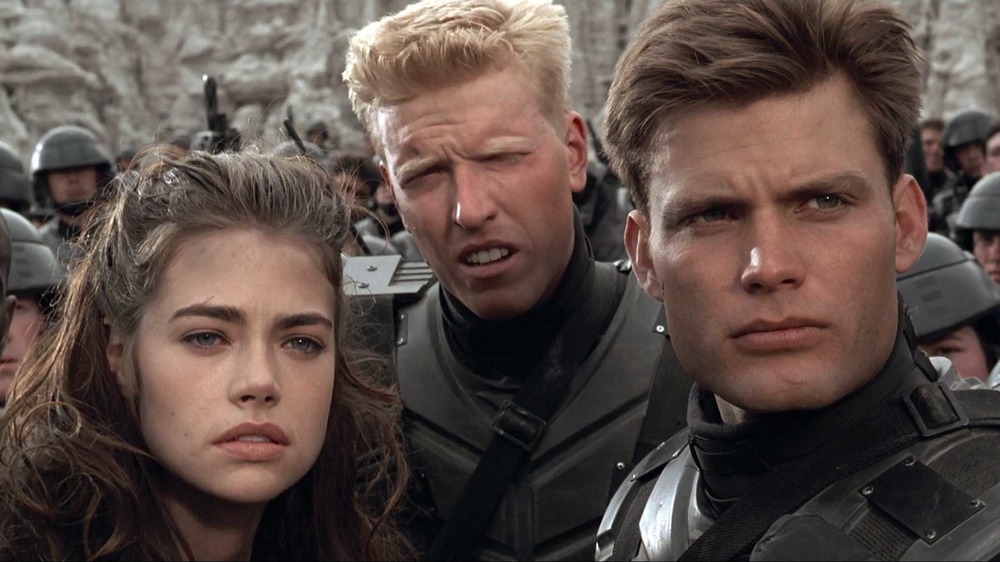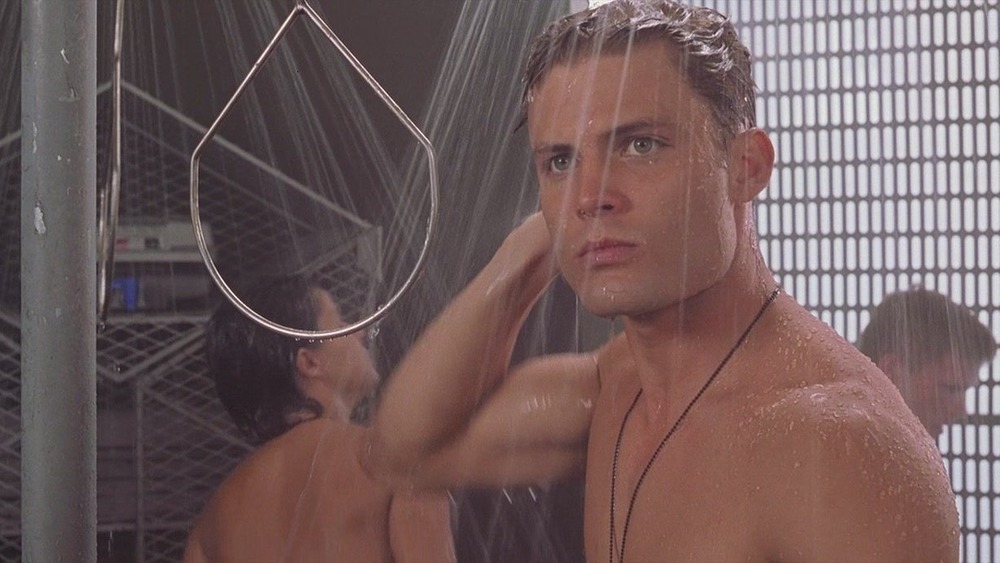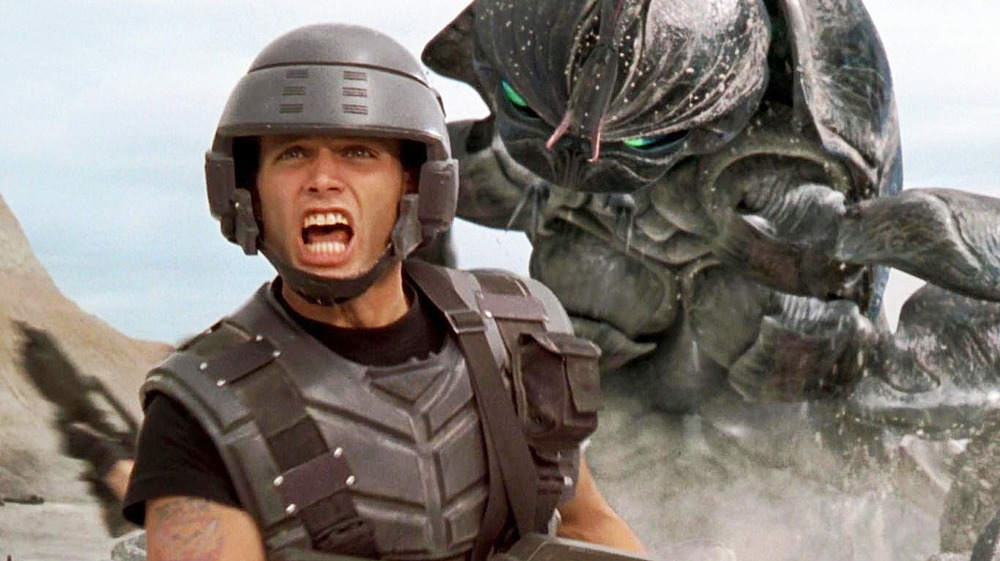The Starship Troopers Scene That Means More Than You Think
Paul Verhoeven's 1997 sci-fi military epic Starship Troopers — based on the 1959 Robert Heinlein novel of the same name — is a singularly crazy film, with the kind of well developed, futuristic society that one might have expected from the director of RoboCop. Set hundreds of years in the future, the film follow Johnny Rico (Casper Van Dien) through his decision to enlist in the "Mobile Infantry," a highly trained, heavily armed unit on the front line of a galactic war with the "Bugs," a hideous alien species which may or may not be intent on conquering the Earth. Johnny follows his girlfriend Carmen (Denise Richards) and best friend Carl (Neil Patrick Harris) into military service, and is also joined by Isabelle "Dizzy" Flores (Dina Meyer), whose unrequited feelings for Johnny complicate matters.
The film is memorable for about a hundred reasons, from its attractive young cast to its intensely violent battle scenes to its frequent use of military recruitment commercials (always punctuated by "Would you like to know more?") that serve to illustrate what seems to be the rather extreme ideology of this future world in which military service is all but compulsory. Another frequent refrain of the commercials — "Service guarantees citizenship" — implies heavily that veterans are not just given favored status in this society, but indeed are the only ones who have the kinds of rights that we take for granted.
The implications of this are laid out nicely in one of the movie's most eye-popping scenes, although you might have missed it. Early in the film, a male Mobile Infantry recruit named "Kitty" with aspirations of becoming a journalist playfully questions his fellow recruits, including an uncooperative Rico, as to their reasons for enlisting. Their answers are quite revealing, but their focus may have been elsewhere, because the scene is also revealing in another, more literal sense.
Starship Troopers' shower scene isn't as gratuitous as it might appear
The scene takes place in a communal shower where all of the recruits, both male and female, are present — and, of course, are buck naked. Kitty's line of questioning evokes a variety of responses. One recruit simply wanted to get off the family farm, Luke Skywalker-style. Another has political aspirations, and "you have to be a citizen for that," she says, "so here I am." Another was accepted to a prestigious university, but couldn't afford the tuition, and yet another wants to have children — and "it's a lot easier to get a license if you serve." Another recruit wants to be career military. Finally, Kitty lands on Rico, who basically tells him what he can go do with himself — but Dizzy won't let him off the hook, telling the other recruits that he enlisted "because of a girl."
It's interesting to note that the entire vibe of the scene is chummy, but not flirty; nobody's eyes ever dip below the neckline, and there's a clear implication that all recruits are equal in each others' eyes. It might be a mark of a truly egalitarian, enlightened society — were it not for a couple of the answers sprinkled in among those that one might hear today, in real life, if they were to ask a soldier why they signed up. Sure, there have got to be a ton of active duty service members who have their eyes on a career in the military, or who saw service as a great way to pay for school or to gain life experience outside their home towns. But the subtext of the responses involving citizenship and the licensing requirement to have children is plain — and lines up nicely with Verhoeven's subversive take on Heinlein's novel.
Starship Troopers flips the theme of the source novel on its head
Heinlein may have been a science fiction pioneer, but he is widely understood to have had some troubling political views — and they have never been more clearly on display than in the novel Starship Troopers, which was written as a knee-jerk response to the anti-nuclear proliferation movement in the Unites States. Consider the classroom scenes in Verhoeven's film, in which Lieutenant Rasczak (the great Michael Ironside) expounds on such subjects as the complete failure of democracy, how "social scientists brought our world to the brink of chaos," and the stabilizing influence of authoritarianism — not to mention the virtues of violence, which he calls "the supreme authority from which all other authorities are derived."
These scenes are loaded with irony; anyone who has seen RoboCop (so, everyone) likely understood what Verhoeven was going for here. He's satirizing the black-and-white authoritarian worldview, but much of this dialogue was lifted almost verbatim from Heinlein's novel, and it's generally agreed that these passages were meant to impart Heinlein's actual political views to the reader.
By subtly shifting the tone to give the material a satirical bent, Verhoeven effectively flipped the might-makes-right, authoritarian worldview of the source novel on its head — a tactic which, if one can look past all of the soapy nudity, is made plain in the clear-eyed responses of some of those recruits during the shower scene. In a 2014 interview with Empire (during which Verhoeven admitted that he had to have screenwriter Ed Neumeier relate to him the story of Heinlein's book, having found it too boring to read himself), the director confirmed his intent. "The idea I wanted to express was that these so-called advanced people are without libido. Here they are talking about war and their careers and not looking at each other at all," he said. "It is sublimated, because they are fascists."
This goes a long way toward explaining why everyone was able to keep their eyes "up here" during the soapy scene. It was a all a part of Verhoeven's grand — and woefully misunderstood — satire of fascism.


